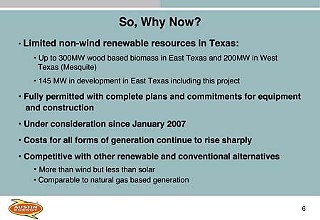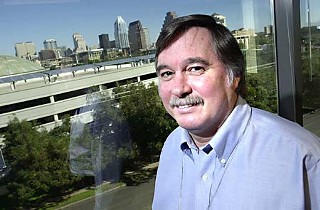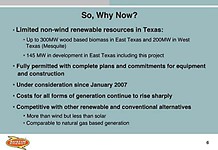Biomass: A Question of Wood, Not Could
Council will vote this week on a proposed wood-waste-fueled power plant, but just because it's carbon-neutral doesn't mean it's perfect
By Daniel Mottola, Fri., Aug. 22, 2008
Austin Energy thinks the time for biomass is now. City Council this week is set to vote on a 20-year, $2.3 billion contract to help construct and buy 100 megawatts of energy from a waste-wood-fueled power plant located outside Nacogdoches in East Texas. The plant will run on debris from the area logging industry, as well as scraps from sawmills, broken pallets, and limbs cleared away from power lines. The plant is considered carbon-neutral and is seen by Austin Energy as a necessity to meet growing power demands while keeping up with the city's goals of generating 30% of its energy from renewable sources by 2020 and adhering to the Austin Climate Protection Plan. Contract in hand, AE wants to seal the deal fast. But at a town hall meeting last Wednesday evening, organized by Council Member Laura Morrison, many expressed sticker shock over the plant's cost, while others questioned whether burning wood is a worthy technology for a city regarded as a clean-energy innovator. Perhaps worst of all was the sentiment that, despite AE's recently announced plans to initiate a public discussion about the city's energy future this fall, had Morrison not called Wednesday's meeting, this 10-figure, two-decade decision might have received very little public scrutiny.
"I think a much broader community discussion would've been preferable," Morrison said. "I rely on the citizens of this community to be asking questions from their perspective and expertise to help us all understand the bigger picture." Asked whether she believes the biomass project is critical to achieving the city's renewable energy and climate protection goals, Morrison said, "A biomass plant could certainly be one piece" of those goals, but "if we don't go forward, I doubt we're doomed to failure." It's a "really, really" big decision, she added, "one that I've definitely lost sleep over."
Located north of Nacogdoches near the town of Sacul, the plant would be the first utility-scale biomass plant in Texas, providing about 75,000 homes' worth of energy by 2012. As AE General Manager Roger Duncan explained at the town hall meeting, the plant's $2.3 billion cost ultimately buys 20 years' worth of renewable energy that's much more constant than wind or solar power. That price includes some construction costs, and the plant's developers, Nacogdoches Power LLC, will ultimately own the plant. Depending on the price of natural gas and the availability of state and federal renewable-energy incentives, Duncan said, the plant could save AE ratepayers an estimated $1.50 per month or add as much as $2.50 to bills. The plant is regarded as carbon-neutral since the CO2 it emits was captured from the atmosphere fairly recently by the trees fueling it and because it prevents the rotting of logging waste, which emits the potent greenhouse gas methane. Concerns were raised over the plant's ozone-forming nitrogen-oxide emissions, with the Sierra Club's Cyrus Reed comparing the plant's NOx output to a newer coal plant. He noted, however, that the plant won't emit coal's problematic sulfur or mercury pollutants.
"Biomass is a good technology for Texas, but I have higher expectations for Austin," said local renewable-energy consultant Mike Sloan. "I'd like to see Austin wean itself off of smokestacks for powering the city as quickly as possible," he said. "Austin should prioritize investment into new technologies that the future hungers for," Sloan said, such as mega-energy-efficiency, solar, advanced devices to interface plug-in electric vehicles with the grid, and smart-load technologies that help consumers and businesses consume energy only when needed or when demand is low. "This 100 megawatt biomass contract is very expensive, about $6,000 per customer," he said, which "would pay for enough rebates for 500 megawatts of local solar installations."

"This plan is not a substitution for wind or solar," Duncan said, addressing the crowd of more than 100 Wednesday night. "Solar has great power characteristics that we need to take advantage of, but we need diversity in our fuel choices." The biggest advantage of biomass is "its capacity factor or the amount of time it's available to generate power," he said. While biomass is available day and night, wind and solar are only available 30-40% of the time, he said. When you combine the biomass plant with the 30 MW solar farm planned for the city's Webberville tract, Austin's total amount of renewable power rises to 18%, Duncan noted, more than half the 2020 goal. But without a high-capacity-factor renewable, he said, "I really don't know how we're going to meet our goal in the next 11 years." Some questioned Nacogdoches Power's claim that 4.5 million tons of logging and mill waste per year are generated within 75 miles of the plant and would remain available. Regardless, said Duncan, AE's contract stipulates that "if they don't deliver power, we don't pay."
News last week that a smaller, 50 MW biomass plant being built in Lufkin could come online by next September left some observers wondering whether growing fuel demand would lead to deforestation and incentivize the burning of virgin timber. While "we can't guarantee that," said Nacogdoches Power Vice President Tony Callendrello Wednesday, "we have every incentive to use waste material." It's most cost-effective, he said, it avoids competition with large forest product companies, and it's best at reducing greenhouse gases. Callendrello added that the plant's logging waste comes primarily from managed pine plantations and that the plant's contracts with suppliers ensure only waste wood is used.
The plant's billion-dollar price tag "is very comparable to the same amount of electricity from a modern natural gas plant based on today's prices," said Mayor Will Wynn via e-mail. "The difference is, this energy is a hedge against the wild spikes of the gas market." Plus, "it's carbon-neutral, so the cost isn't going to climb when federal climate legislation passes in the next year or two, driving up the cost of coal and natural gas (legislation both Presidential candidates have said they'll sign). And it's renewable, so our costs are going to be even lower when the Renewable Energy Production Tax Credits are reauthorized next year."
Never one to let a city energy decision escape scrutiny, Paul Robbins, an omnipresent energy watchdog and publisher of The Austin Environmental Directory, took great umbrage with the deal, calling it "bad form and bad public process at best and, at worst, irresponsible." Robbins said wind power with compressed-air storage, now being utilized in Iowa, could be much cheaper and cleaner. He also faulted what he sees as a no-bid contract for Nacogdoches Power and argued that the City Charter requires a public vote on such a large expenditure, since it incurs contract-related debt. (Duncan said the city legal department disagrees.) Most disturbing, Robbins said, was that "up until Morrison called the meeting, council was willing to go along with staff" without question, he said, illustrating how divorced most council members are from the public.
On the council's perceived rush to OK the plant, Wynn said, "Several council members had questions, and once Austin Energy said that the agreement enabled a modest delay, there was solid consensus to present more information and get more feedback." An item relating to the plant first appeared on City Council's agenda Aug. 7. "But fundamentally, fixed-price transactions like this, in a very competitive marketplace, can't cool their heels for months on end waiting for a decision," said Wynn. Because the cost of construction materials inflates by 2% per month, one is forced to fish or cut bait, he said. "Unfortunately that dynamic doesn't complement Austin's paralysis-by-analysis leanings."
City Council is set to vote on the biomass plant today (Thursday). Although the plant doesn't meet the highest standards of Austin enviros and its introduction to the public was less than eloquent, it may be the only carbon-neutral, fossil-free electricity option Austin Energy and veteran green-crusader Duncan can pull off in the near term. "We need biomass in addition to wind. We also need geothermal; we need ocean power; we need all the renewable sources that we can find to meet this very aggressive [30% by 2020] goal," he said. "This is a strategic 'no-brainer' that will keep our electricity costs lower than the alternatives," Wynn added. The big question is whether the biomass plant can overcome public discomfort over a hurried timeline and a seemingly premium price tag.
Got something to say on the subject? Send a letter to the editor.










